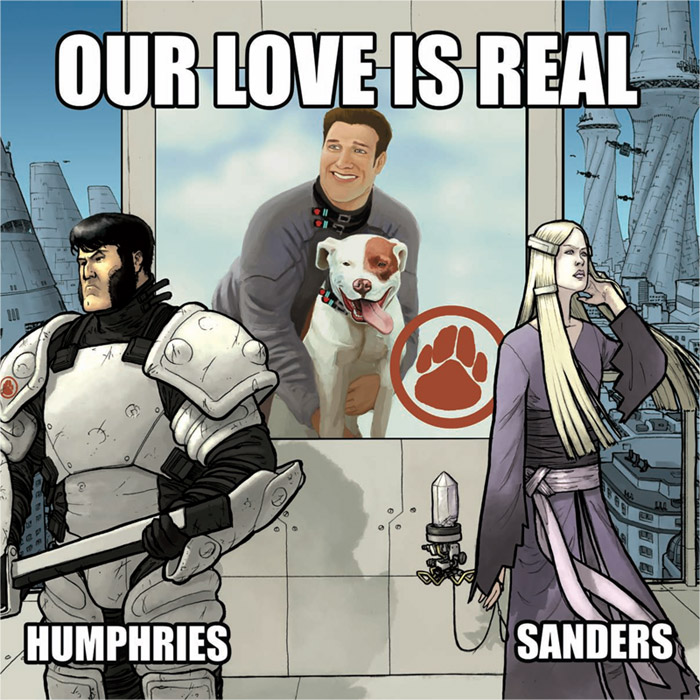The same two guys who created Captain America also created the genre of romance comics.
Not at the same time, of course.
Captain America debuted in Captain America Comics, from 1941, while Young Romance didn’t hit the newsstands until 1947. One was a hard-punchin’ Nazi-fighter serial with a boy sidekick named “Bucky,” while the other was more concerned with the overblown hysterics of men and women—in self-proclaimed “adult” stories—whose secret passions threatened to destroy the fabric of their very lives. Both came from the fertile imaginations of Joe Simon and Jack Kirby.
I’m sure there’s something symbolic in the fact that Simon and Kirby’s sentinel of liberty, targeted at a youth audience, was little more than an avatar of violence (though patriotically good-intentioned, of course), while the heroes and not-quite-heroes of their romance comics, targeted at a slightly older audience, were bound up in a world of lies and betrayal. Lessons learned: those playground punches may hurt for a while, but just wait until you start dating. Then you’re going to start feeling a whole new kind of pain.
I don’t know that writer Sam Humphries and artist Steven Sanders had either Captain America or Young Romance in mind when they created the recently self-published Our Love is Real comic. But the Simon and Kirby influence is inescapable.
Humphries and Sanders don’t shy away from the tropes of the romance comic in their 24-page issue, yet they combine an overt love story with skull-smashing action and a sci-fi setting. They also clearly have something to say. This isn’t just a comic book dabbling in love and violence, in sex and death. No, this is a comic with a not-so-subtle commentary on the way our culture continues to judge the sexual proclivities of others.
This is satire, baby! And the target: prejudice.
Satire is a dangerous thing. Not because of the way it can tear down monolithic structures or subvert everything that is good and right (or bad and wrong) with the world. But because so much satire is unbearably terrible. It’s easy to ridicule what’s wrong with the world, it’s easy to draw a silly-looking cartoon and label every thing in it so your readers won’t be confused by your elegant wit, and it’s easy to get cheers from the already-on-your-side and jeers from the everyone-else, but the problem with satire is that it often gets in its own way.
“Our Love is Real” threatens to get in its own way—and it seems like it may fall into the usual satire trap, where the entire story is just build-up for an obvious social or political message—but just as Humphries and Sanders lean toward hitting you directly over the head with the brick of good intentions, they pull back and end up telling a different kind of story. In the end, though the comic is couched as a satire, and though it ridicules and mocks prejudice (as it should), it’s a love story. A painful love story—as all of them are—about two characters that can’t really be together, except maybe they can.
The comic, narrated by the brutal police officer named Jok, takes place in the future, “after one of the vegisexual riots” says the caption in the opening panel. Jok’s no sympathetic hero. If he’s Captain America, and he kind of is, though a twisted, overtly fascist version, then he’s only a Captain America in his own mind. To everyone around him he’s either a terrifying menace who talks about how “fun” it is to “crush” the vegisexuals (these would be people whose sexual orientation leans toward the more botanic varieties), or he’s just one of the boys—the subject of locker room taunting because he dared to speak to a young lady, or, as one of his colleagues mockingly calls it, a “girrrrrrrrrrrl.”
Humphries and Sanders have created a world in which heterosexual love and intimacy is not taboo, but it is so old-fashioned as to be absurd. Jok isn’t even a heterosexual, as he proudly points out. He’s a zoosexual. His lover is a poodle.
And the girl, Brin, he begins to have feelings for, well, she’s not what she seems either. In more ways than one.
This is strong work from both Humphries and Sanders, a story that sets its metaphorical catapult, loaded with a fiery dose of satirical intent, but while it distracts you with that looming threat, it blindsides you with an attack from the side. A more earnest, sincere salvo. Because a satire is only as good as the story which surrounds it. At the end of the day, “Our Love is Real” isn’t going to change anyone’s mind about marriage rights or DADT repeals or anything else in the realm of sexuality and relationships. It might make you think a little about those topics though. It might make you think, period.
More importantly, though, with its visceral imagery and its underlying love story, it might make you feel.
It’s what Simon and Kirby would have wanted, I’m sure, even if they wouldn’t have ever dared to tell this kind of story during their heyday. Our Love is Real is, after all, labeled with a warning: “Mature Content / Hide Your Children.”
Tim Callahan reads all the comics. Sometimes he writes about them. But not all of them. That would be ridiculous.










